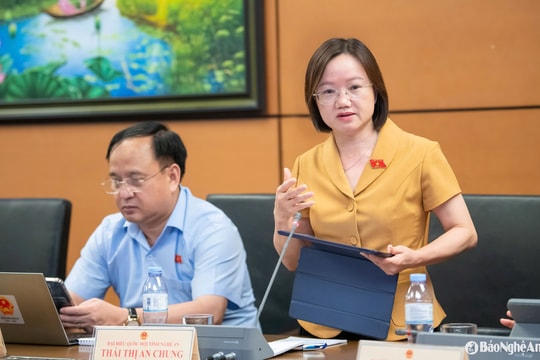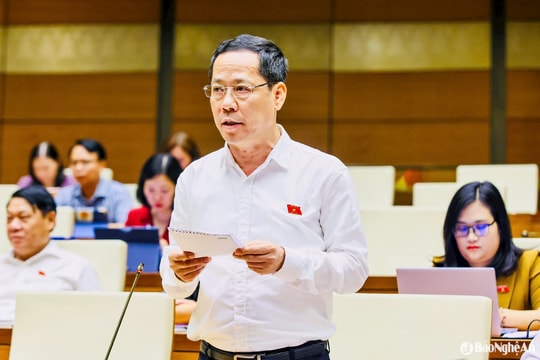Nghe An National Assembly Delegation: 'Children are still abused in tourism activities'
(Baonghean.vn) - Continuing the working program of the 2nd Session of the 14th National Assembly, on the morning of November 8, under the direction of Mr. Nguyen Dac Vinh - Member of the Party Central Committee, Secretary of the Provincial Party Committee, Head of the National Assembly Delegation of Nghe An province, Head of Group 3, National Assembly deputies of 4 provinces including Tra Vinh, Hoa Binh, Lai Chau and Nghe An discussed in groups about the Draft Law on Irrigation and the amended Law on Tourism.
At this discussion, the National Assembly Delegation of Nghe An province had 11 comments on related contents.
Regarding the Draft Law on Irrigation,The majority of the National Assembly deputies of Nghe An province commented that Vietnam is a country directly affected by the tropical monsoon climate, hot, humid, extremely harsh natural conditions, the total rainfall in the year is large but unevenly distributed in time and space. Along with the process of industrialization, urbanization and population growth, socio-economic development, the demand for water supply and drainage becomes more urgent.
Irrigation development is the development of essential infrastructure works, serving agricultural production, contributing significantly to increasing productivity, output and quality of agricultural and aquatic products, supplying water for people's lives and other economic sectors, draining water to prevent floods, contributing to preventing and mitigating damage caused by natural disasters, contributing to sustainable socio-economic development. To proactively respond to climate change, delegates said that the promulgation of the Irrigation Law in the current conditions is very necessary.
 |
| Discussion scene in group 3. |
However, giving specific comments on the draft law, delegate Le Quang Huy (Nghe An) said that the scope of regulation of the Law overlaps with other Laws; therefore, it is necessary to ensure consistency with the relevant legal system such as the Law on Water Resources, Law on Prices, etc.
Regarding the responsibility for managing irrigation works, Article 22 proposes to clearly stipulate the principles of the form of operation, selecting and signing all material contracts with economic units and irrigation services; Article 40 needs to add specific regulations on dividing revenue from exploitation activities; add regulations on maintenance, repair, upgrading and modernization of irrigation works...
Emphasizing that the draft law still lacks provisions on the responsibility to compensate for damages caused by organizations and individuals in the process of exploiting irrigation works. Delegates said that in recent times, the flood discharge process in localities has caused great damage, so it is necessary to stipulate the responsibility to compensate for damages for each entity and the specific compensation level for cases causing damage.
According to delegate Tran Van Mao (Nghe An), in Clause 4, Article 3, it is necessary to add the phrase "not depending on administrative boundaries" at the end of the sentence and write in full as "The irrigation system is a collection of irrigation works that are directly related to each other in a basin or a certain area regardless of administrative boundaries"; in Clause 2, Article 8, it is proposed to remove the phrase "hazardous waste" because the prohibition of waste includes hazardous waste; add the phrase "water balance" to the first paragraph for completeness and rewrite as: "Irrigation planning serves water balance and determines water supply methods..." in Clause 1, Article 11; add the phrase: province, centrally run city and rewrite: Comprehensive irrigation planning is established on the basis of the whole country, province, centrally run city, socio-economic region in Point a, Clause 3, Article 11...
Also according to delegate Tran Van Mao, Clause 2, Article 16 stipulates that "Organizations and individuals benefiting from the project are responsible for investing in the construction of the connecting project with the main water supply system and the internal project system" is not feasible, the investment cost of the connecting project with the main water supply system depends on the scale of the project and is generally very large. Therefore, it leads to unfinished investment, there are key projects without canals, the projects are not effective...
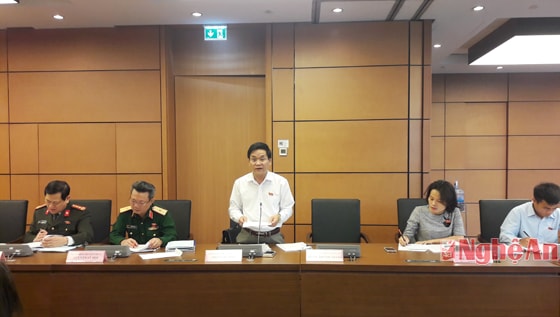 |
| National Assembly Deputy Tran Van Mao gives comments on the draft Law on Irrigation. Photo: Diep Anh. |
Irrigation planning is also one of the contents that many National Assembly deputies are interested in discussing. According to delegate Nguyen Thanh Hien (Nghe An), in reality, there have been irrigation projects where the water "flows backwards" when put into operation, therefore, irrigation planning must ensure synchronization with other technical infrastructure planning; clearly identify investment resources to avoid spreading or when the project is approved, there are not enough resources to implement.
Regarding the responsibility for planning, the authority to approve the planning adjustment, the announcement and management of the implementation of irrigation planning, the National Assembly deputies basically agreed with the draft Law. Point d, Clause 3, Article 13 of the draft Law stipulates: Organizations, individuals and residential communities are given the opportunity to exercise the right to supervise the implementation of irrigation planning. Some deputies said that the democratic regulations at the grassroots level are currently being implemented, people know, people discuss, people do, people inspect and supervise.
According to the provisions of the draft Law, people are only allowed to supervise the implementation of irrigation planning. Deputy Nguyen Thanh Hien said that such provisions are not sufficient; at the same time, he suggested that people need to be involved in planning work right from the first stage, from planning to implementation.
Regarding the Draft Law on Tourism,Opinions say that in recent times, the tourism industry has had important changes, however, this development is still not commensurate with the potential, many new problems arise in practice. Many members of the National Assembly Delegation of Nghe An province believe that tourism is a key economic sector, with forecasts for the next 10-20 years, so the Law must have an impact towards forecasting the development of the tourism industry into a key economic sector of our country. Therefore, it is necessary to update the viewpoints, goals, and strategic solutions for tourism development until 2020, with a vision to 2030.
Specifically, delegate Phan Dinh Trac (Nghe An) said that the draft Law needs to have regulations to ensure the quality of tour guides, improve the understanding of culture and tourism of Vietnamese people, and have sanctions to manage community tourism forms such as prices, food hygiene and safety, fire prevention, etc. Delegates Nguyen Thi Thao and Moong Van Tinh (Nghe An) suggested that the Drafting Committee should conduct more research, build a clear legal corridor, specific mechanisms, create motivation and a favorable environment to promote tourism development but still ensure strictness to help this industry develop faster.
According to delegate Dinh Thi Kieu Trinh (Nghe An), the tourism and service industry is currently using a lot of child labor. Up to now, there has been no data assessing the labor intensity of children participating in providing tourism services, but in reality, there are some cases where children are subjected to high work intensity; children are exploited to provide tourism services during peak tourist seasons. Not only in Vietnam, children participating in labor in the tourism and service industry also occurs in many countries around the world...
However, the current Tourism Law and the draft Tourism Law (amended) do not mention the concept of child labor in tourism, clearly defining the types of tourism services that children can participate in if they are able. The rights of children when providing tourism services, the responsibilities of employers, sanctions for exploiting child labor... are therefore not mentioned in this specialized law.
Therefore, the Draft Law needs to clearly stipulate activities and services that are not provided to children, prohibit the use of child labor; specific conditions for tourism activities and services that are allowed to use child labor... in accordance with the specific characteristics of each industry...
When amending this Law, there should be regulations to ensure tourism development while contributing to comprehensive protection for children.
Also according to delegate Dinh Thi Kieu Trinh, in Clause 5, Article 5, it is necessary to supplement policies on human resource training in the tourism industry because this is a special industry that needs to ensure the preservation of fine customs and traditional culture of the country and regions as well as meet objective requirements in each period of international integration... Regarding the participation of the community in tourism development in Clause 3, Article 7, it should be re-regulated that "the grassroots government guides the community to build village conventions and conventions on tourism and protect tourism resources".
The delegate also said that currently, the development of e-commerce in the tourism sector is very developed. The management of prices, tour quality, and tax obligations for online business in the tourism sector has not been mentioned. Therefore, the revised Law on Tourism needs to cover the above cases and types of transactions when regulating "Travel contracts with tourists" and "Travel contracts". Travel contracts with tourists can be made in writing or in other forms (tickets, vouchers, online contracts...) as permitted by the Civil Code and the Commercial Law - delegate Dinh Thi Kieu Trinh emphasized.
Regarding regulations on tour guides, in the face of the reality that foreigners come to Vietnam for tourism, then stay to work as tour guides, unable to control the information they exchange with tourists; small domestic businesses are willing to sell their brands so that foreign businesses can operate under their cover, the majority of delegates agreed on the view that only Vietnamese people can be considered for a tour guide card in Vietnam if they meet all the conditions according to regulations, foreigners are not allowed to operate tourism in Vietnam...
Based on the limited analysis, the delegates said that tourism inspection is necessary. The delegates suggested that it should be a specialized tourism inspector to ensure quality and safety for tourists, contributing to building the tourism brand.
Huyen Thuong - Diep Anh

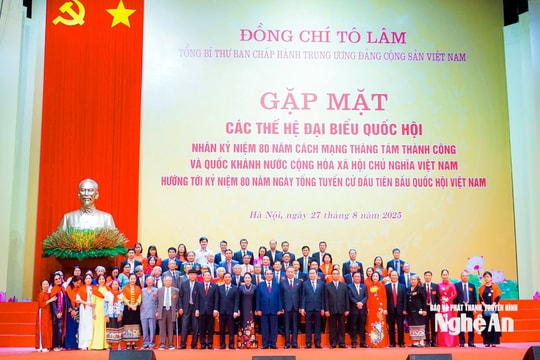
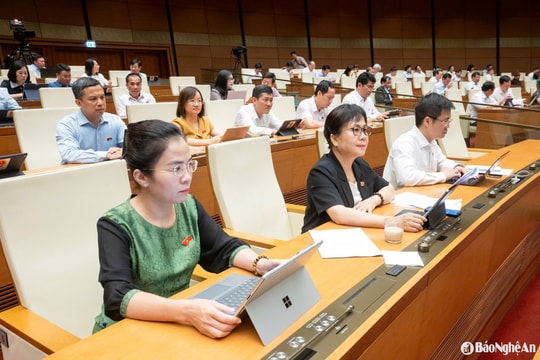
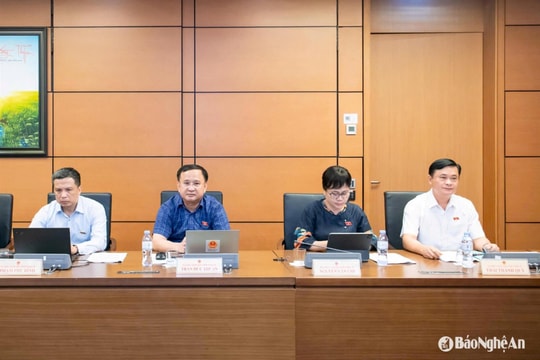
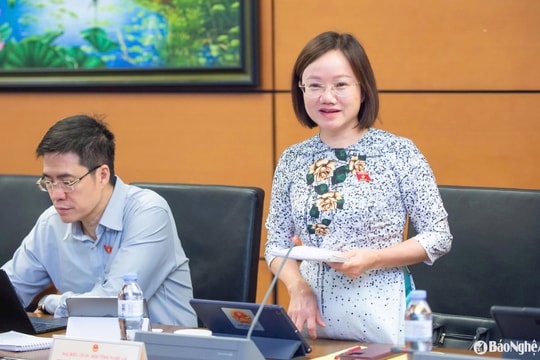
.jpg)
